 Petzlover
Petzlover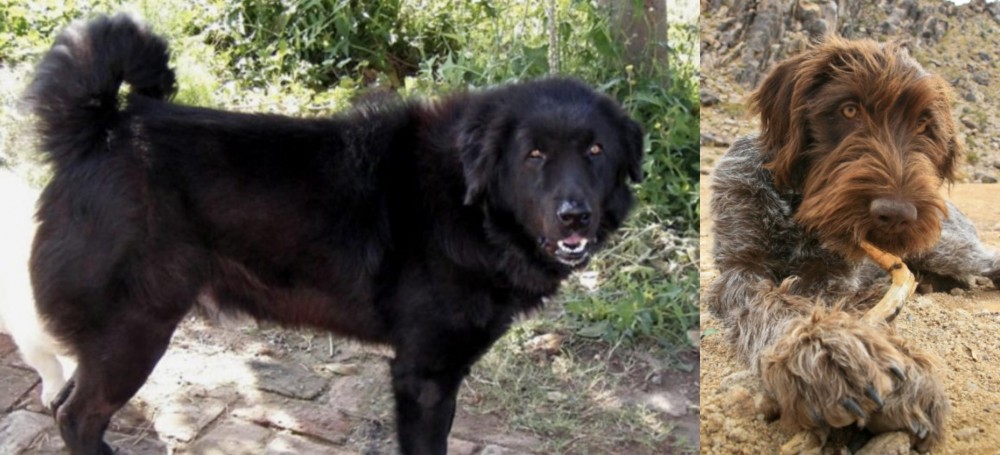 Bakharwal Dog is originated from India but Wirehaired Pointing Griffon is originated from France. Bakharwal Dog may grow 16 cm / 7 inches higher than Wirehaired Pointing Griffon. Bakharwal Dog may weigh 9 kg / 20 pounds more than Wirehaired Pointing Griffon. Both Bakharwal Dog and Wirehaired Pointing Griffon has same life span. Bakharwal Dog may have less litter size than Wirehaired Pointing Griffon. Both Bakharwal Dog and Wirehaired Pointing Griffon requires Moderate Maintenance.
Bakharwal Dog is originated from India but Wirehaired Pointing Griffon is originated from France. Bakharwal Dog may grow 16 cm / 7 inches higher than Wirehaired Pointing Griffon. Bakharwal Dog may weigh 9 kg / 20 pounds more than Wirehaired Pointing Griffon. Both Bakharwal Dog and Wirehaired Pointing Griffon has same life span. Bakharwal Dog may have less litter size than Wirehaired Pointing Griffon. Both Bakharwal Dog and Wirehaired Pointing Griffon requires Moderate Maintenance.
 The precise origin of the large Bakharwal Dog is undocumented. It is believed the breed originated from the Tibetan Mastiff, the Molosser, the Tuvan Sheepdog and others. It is an ancient working breed where it has been bred for many centuries by the Bakarwal and Guijar tribes. The dog is thought to be the rarest of all the ancient herding breeds.
The precise origin of the large Bakharwal Dog is undocumented. It is believed the breed originated from the Tibetan Mastiff, the Molosser, the Tuvan Sheepdog and others. It is an ancient working breed where it has been bred for many centuries by the Bakarwal and Guijar tribes. The dog is thought to be the rarest of all the ancient herding breeds.
The Bakharwal is an indigenous breed of Himalayan origin, being bred exclusively by those wanting a strong, brave dog to protect their livestock. Today Jammu and Kashmir in North India is predominantly the stronghold of this breed.
The Bakharwal dog today as we know it is a muscular dog, tall and powerful and with a thick, fluffy coat. He has remained a livestock guardian or herding dog for the people occupying the Pir Panjal mountain ranges for centuries.
Unfortunately the breed’s rarity as well as his lack of recognition has put this attractive dog in danger of becoming extinct, and in fact steps have been taken to have the dog listed as an endangered species. The females only produce small litters of between 1 to 3 puppies. There are currently no breeding clubs for the Bakharwal Dog and the other sad aspect is that the breed isn’t recognized by any of the major kennel clubs.
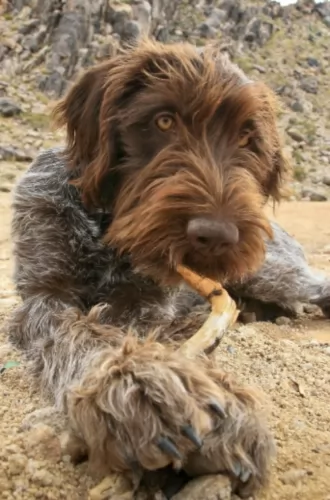 Known also as the Korthals Griffon, the Wirehaired Pointing Griffon is a hunting- and gundog. It was Eduard Karel Korthals who is thought to have brought about this dog breed around 1873.
Known also as the Korthals Griffon, the Wirehaired Pointing Griffon is a hunting- and gundog. It was Eduard Karel Korthals who is thought to have brought about this dog breed around 1873.
He was a Dutchman living in France. It is believed that quite a few dog breeds were used to bring about this dog such as the Otterhound, Spniels, Setters and possibly a Pointer. The dog is known as a supreme gundog and it is a very popular dog breed.
Edward Korthals of Holland was looking for an ideal gun dog. It was in 1888 that the first Griffon Club was formed. It was only in 1916 that this dog was officially recognized as the Wirehaired Pointing Griffon in the United States.
 This dog is large, heavily boned, muscular and with a deep chest. They’ve got large heads and a thick, muscular neck. The nose is black, the almond-shaped brown or amber eyes gentle while the ears are medium sized and drooping. The tail is long and bushy and mostly curls over the back of the dog. Their thick coats are available in a number of colours such as cream, tan, white, black and piebald.
This dog is large, heavily boned, muscular and with a deep chest. They’ve got large heads and a thick, muscular neck. The nose is black, the almond-shaped brown or amber eyes gentle while the ears are medium sized and drooping. The tail is long and bushy and mostly curls over the back of the dog. Their thick coats are available in a number of colours such as cream, tan, white, black and piebald.
The Kashmiri Sheepdog has long legs and although a number of sizes exist, the regular height of the dog is roughly 61 to 76 cm.
Known also by several other names such as the Kashmir Mastiff, Kashmir Sheepdog or Bakarwal Mastiff, this dog is well known for his ferociousness, and guarding his human family is taken seriously. His courage knows know limits and he is both protector and friend, a loyal and devoted companion.
He forms a strong bond with his human family and is good natured with well behaved children who have been taught to treat animals with kindness. Caution should always be practised with small children as this is a large dog. He is playful, social and adaptable with his human family but won’t take kindly to other pets. Socialization and training are important for this strong-willed dog.
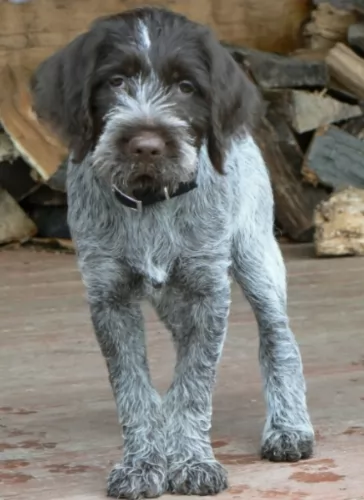 The Wirehaired Pointing Griffon or Korthals Griffon is a medium-to-large sized dog standing at between 50 and 60cm both male and female and weighing between 23and 27kg.
The Wirehaired Pointing Griffon or Korthals Griffon is a medium-to-large sized dog standing at between 50 and 60cm both male and female and weighing between 23and 27kg.
He has a wiry, somewhat harsh curly outer coat and a softer undercoat. The head is quite large. He has thick eyebrows and a beard. The eyes are brown with yellow irises.
This is a low-shedding dog. There are a few colors such as white and brown, white and orange but the coat is also steel gray with brown markings.
These dogs are intelligent and independent with a desire to please their owners. He is able to learn tricks and commands easily. They love their human families and want to be around them all the time.
It would be devastating for such a dog to find himself stuck in the backyard with no human contact. He is also not suited to cramped living conditions in the city but is essentially a country dog, especially since he has boundless energy.
As a family pet, he is playful, friendly, loyal, loving and gentle, behaving well with children and other pets. They’re not aggressive dogs but they make excellent watchdogs, barking if someone comes into their property.
 Bred exclusively as a livestock guardian dog, the large Bakharwal is a steadfast, loving, brave guardian. He is good with people of all ages and will protect his human family with his life.
Bred exclusively as a livestock guardian dog, the large Bakharwal is a steadfast, loving, brave guardian. He is good with people of all ages and will protect his human family with his life.
To this day the breed has a strong herding and guarding instinct, and because he is a large breed with herding instincts, he won’t be suited to apartment living. He needs a good sized garden to run in and will require exercising to stave off frustration and boredom.
Look after your Bakharwal well, especially as there aren’t many of them left. Loved, nourished and cared for, he’s just waiting to make you part of his ‘flock’ and in exchange he’ll be your loyal and devoted friend who will protect you with his life.
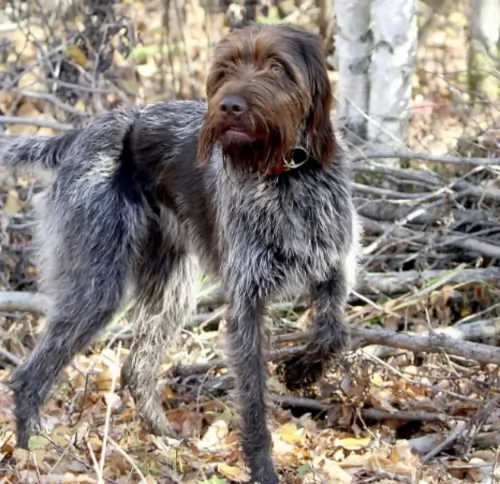 The Wirehaired Pointing Griffon has always been a great hunting dog and he doubles as an excellent pet and companion as well.
The Wirehaired Pointing Griffon has always been a great hunting dog and he doubles as an excellent pet and companion as well.
This dog is extremely loyal to his human family and is friendly, intelligent, loving and affectionate, getting on well with children as well as other pets in the home.
He can reach 14 years of age and doesn’t often get sick, making him an all-round great pet and companion.
 Your Bakharwal puppy will need to see the vet for a complete check up and to receive his puppy vaccinations. These innoculations immunize your puppy from hepatitis, distemper, leptospirosis, parvovirus and parainfluenza.
Your Bakharwal puppy will need to see the vet for a complete check up and to receive his puppy vaccinations. These innoculations immunize your puppy from hepatitis, distemper, leptospirosis, parvovirus and parainfluenza.
As he grows older, you’ll need to keep his teeth free from dental plaque by using a special dog toothbrush and toothpaste.
Ticks and fleas – speak to your vet about the most effective way to treat these parasites. heartworm – this is important if your dog is exposed to lots of mosquitoes. Heartworm infestations are potentially deadly. spaying and neutering is important at 6 months of age to protect your pet from unwanted puppies and disease.
 The coat of the Bakharwal Dog is thick, flat and of medium length and he is a relatively low maintenance dog. Brushing the dog’s coat twice a week will be adequate to remove loose hairs, although professional grooming can be a good thing as the density of the coat makes trimming the coat a necessity. The eyes, ears, teeth, and nails of the Bakharwal Dog should also be examined regularly just to ensure no health problems develop.
The coat of the Bakharwal Dog is thick, flat and of medium length and he is a relatively low maintenance dog. Brushing the dog’s coat twice a week will be adequate to remove loose hairs, although professional grooming can be a good thing as the density of the coat makes trimming the coat a necessity. The eyes, ears, teeth, and nails of the Bakharwal Dog should also be examined regularly just to ensure no health problems develop.
Bakharwal puppies from 8 to 12 weeks will require meals 4x a day. From 6 months on he can start having 2 meals a day. Top-quality dry- or wet dogfoods will guarantees balanced nutrition, and speaking to your veterinarian will give you an idea of what is best for your canine friend. To ensure your dog doesn’t suffer with a dry, scratchy skin, remember to include raw- and cook meat into his food. Protein is an essential ingredient for the health of your dog. Always ensure clean, cool water is available and wash food- and water bowls regularly.
Make sure your Bakharwal Dog gets plenty of exercise every day to maintain good health. Take him for walks to give him new sounds, smells and sights.
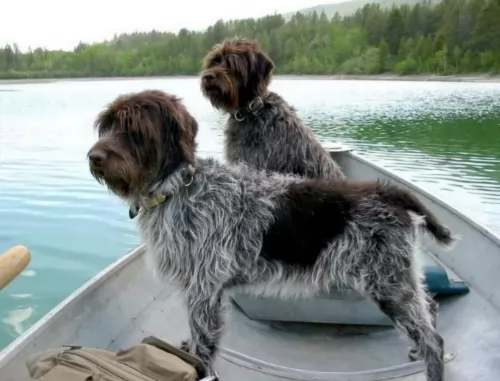 This dog loves his exercise, and if you live in the country so much the better. He will love to go hiking and swimming with you or running next to you as you go cycling. He also loves all kinds of rope- and ball games in the garden. It’s why this active dog isn’t ideal for life in the city.
This dog loves his exercise, and if you live in the country so much the better. He will love to go hiking and swimming with you or running next to you as you go cycling. He also loves all kinds of rope- and ball games in the garden. It’s why this active dog isn’t ideal for life in the city.
Spay or neuter your pet if you don’t want unwanted puppies. Don't do it too early. Speak to your vet about the procedure and about the health benefits that come from spaying and neutering a dog.
These are active dogs and they will require top quality food if they’re to remain healthy and active.
Always check the packaging to see what ingredients are present in your dog’s food. Some of the cheaper, more inferior brands can actually be harmful to your pet with their useless ingredients devoid of vitamins and minerals.
Some home-made food is good and this needs to be plain and free from spicy additives. Dogs have sensitive stomachs and anything unusual can cause them digestive problems.